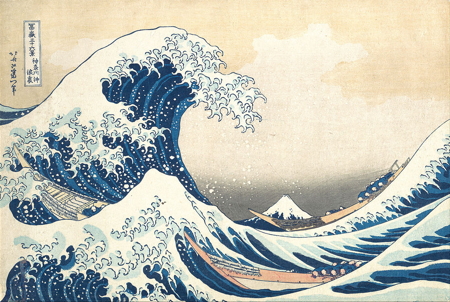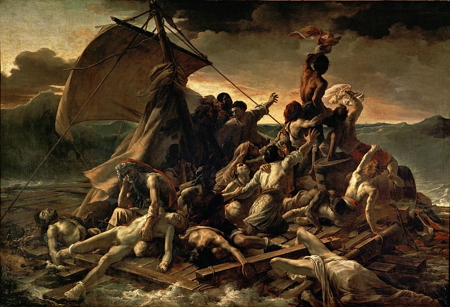
[Katsushika Hokusai, “The Great Wave off Kanagawa” (c. 1829–1833)]
[Note: This post is part of a series on the History of the Classical Liberal Tradition]
When did classical liberals become self-conscious that they were advocating an entire worldview (Weltanschauung) of politics, economics, and social relationships in general which was a) consistent internally, b) was different from other worldviews (such as socialism),and c) which could be articulated in one volume? I have made an attempt to list some examples of this.
I begin with a collection of one volume surveys of the classical liberal position which have appeared over the past two centuries. The defining characteristic is that they are an attempt to provide the reader with a survey of the basic political and economic principles behind the classical liberal tradition as well as some concrete proposals for reform in order to bring about a freer society. The defining characteristic is that they are an attempt to provide the reader with a survey of the basic political and economic principles behind the classical liberal tradition as well as some concrete proposals for reform in order to bring about a freer society.
With the exception of Wilhelm von Humboldt’s The Limits of State Action which was written in 1792 but was not published in full until 1854, it seems that it was not until the mid-19th century before people began thinking of classical liberalism as a coherent body of thought which could be encapsulated in a one volume treatment. I include in this early group Gustave de Molinari, Herbert Spencer, and John Stuart Mill who published their books between 1849 and 1859. Molinari’s Evenings on Saint Lazarus Street (1849) is perhaps the first one volume, comprehensive statement of the classical liberal political and economic worldview designed to appeal to an educated reader rather than a specialist, ever written.
We can mark this group or “first wave” as part of the emergence of “classical liberalism” per se, which saw the dramatic liberal reforms of the Victorian period, such as the repeal of the Corn Laws which ushered in the period of free trade which lasted up until the First World War.
There is a second group which emerged in the 1970s when the modern libertarian movement appeared in the United States and include works by John Hospers, David Friedman, and Murray Rothbard, . Several of these were designed to be political “manifestos” for groups like the Libertarian Party (founded 1971).
One might also pinpoint the period of the last 10 years as the latest burst of activity with works by Eric Mack, Richard Ebeling, Deidre McCloskey, and perhaps George Will.
I have been putting online as many of the “first wave” of these books as I can find.
Here is my list ( a version of which is at my website in the section on “The Great Books of Liberty”:
First wave:
- Wilhelm von Humboldt, Ideen zu einem Versuch, die Gränzen der Wirksamkeit des Staates zu bestimmen (Ideas presented in an Attempt to determine the Limits of State Activity) (1792, 1854)
- Benjamin Constant, Principes de politique, applicables à tous les gouvernemens représentatifs (The Principles of Politics which are applicable to all Representative Governments) (1815)
- Gustave de Molinari, Les Soirées de la rue Saint-lazare (Evenings on Saint Lazarus Street) (1849)
- Herbert Spencer, Social Statics (1851)
- JS Mill, On Liberty (1859)
- Herbert Spencer, The Principles of Ethics (1879)
- Bruce Smith, Liberty and Liberalism (1888)
Second wave (20th century before the modern libertarian movement emerged)
- Ludwig von Mises, Liberalismus (Liberalism) (1927)
- Friedrich A. Hayek, The Constitution of Liberty (Chicago: Henry Regnery, 1960)
- Milton Friedman (with the assistance of Rose D. Friedman), Capitalism and Freedom (University of Chicago, 1962)
Third wave (which coincided with the emergence of the modern libertarian movement):
- John Hospers, Libertarianism – A Political Philosophy for Tomorrow (Los Angeles: Nash, 1971)
- David Friedman, The Machinery of Freedom: Guide to a Radical Capitalism (1973)
- Murray N. Rothbard, For a New Liberty (New York: Macmillan, 1973)
- Milton Friedman and Rose Friedman, Free to Choose: A Personal Statement (Harcourt, Brace, Jovanovitch, 1980; Harmondsworth: Penguin, 1980)
And the current, perhaps “Fourth” wave:
- Eric Mack, Libertarianism (Key Concepts in Political Theory. Polity, 2018)
- Richard Ebeling, For a New Liberalism (American Institute for Economic Research, 2019)
- George F. Will, The Conservative Sensibility (Hachette Books, 2019).
- Deirdre McCloskey, Why Liberalism Works: How True Liberal Values Produce a Freer, More Equal, Prosperous World for All (Yale University Press, 2019)
Of course, in spite of this latest wave of libertarian activity, the world may nevertheless still end up in an ideological and political shipwreck for lovers of liberty.

[Théodore Géricault, “Scène de Naufrage” (Shipwreck Scene) or “The Raft of the Medusa” (1818–19)]
